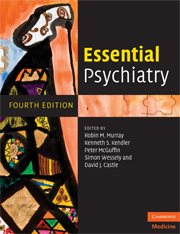Book contents
- Essential Psychiatry
- Essential Psychiatry
- Copyright page
- Contents
- Contributors
- Preface to the fourth edition
- Section 1 The Tools of Psychiatry
- Section 2 Psychiatric Disorders
- 6 Psychiatric disorders in childhood and adolescence
- 7 Personality disorder
- 8 Anxiety disorders
- 9 Eating disorders
- 10 Alcohol problems
- 11 Drug use and drug dependence
- 12 Affective disorders
- 13 Schizophrenia and related disorders
- 14 Neuropsychiatry
- 15 The psychiatry of old age
- 16 The psychiatry of intellectual disability
- 17 Sexual problems
- Section 3 Special Topics
- Section 4 Psychiatry in Specific Settings
- Section 5 Treatments in Psychiatry
- Index
11 - Drug use and drug dependence
from Section 2 - Psychiatric Disorders
Published online by Cambridge University Press: 22 August 2009
- Essential Psychiatry
- Essential Psychiatry
- Copyright page
- Contents
- Contributors
- Preface to the fourth edition
- Section 1 The Tools of Psychiatry
- Section 2 Psychiatric Disorders
- 6 Psychiatric disorders in childhood and adolescence
- 7 Personality disorder
- 8 Anxiety disorders
- 9 Eating disorders
- 10 Alcohol problems
- 11 Drug use and drug dependence
- 12 Affective disorders
- 13 Schizophrenia and related disorders
- 14 Neuropsychiatry
- 15 The psychiatry of old age
- 16 The psychiatry of intellectual disability
- 17 Sexual problems
- Section 3 Special Topics
- Section 4 Psychiatry in Specific Settings
- Section 5 Treatments in Psychiatry
- Index
Summary
Keywords
- Type
- Chapter
- Information
- Essential Psychiatry , pp. 230 - 249Publisher: Cambridge University PressPrint publication year: 2008
- 1
- Cited by

